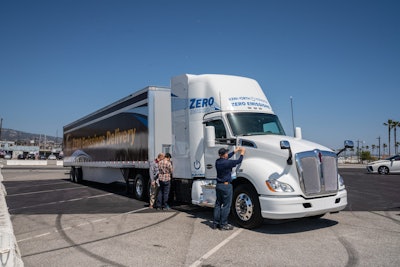
Ready or not, here they come.
The California Air Resources Board recently announced that zero emission trucks and vans are now the law of the land in California.
In what CARB is calling the first rule of its kind in the world, starting in 2024, OEMs must begin transitioning to zero emission truck and van sales in the Golden State. By 2045, all new trucks and vans sold there have to be zero emission.
“California is an innovation juggernaut that is going electric,” said Jared Blumenfeld, California’s Secretary for Environmental Protection. “We are showing the world that we can move goods, grow our economy and finally dump dirty diesel.”
Ports and railyards are at the top of the list. Concerns over air quality in neighborhoods adjacent to ports and railyards are driving the state to require zero emission drayage fleets by 2035.
Zero-emission final mile delivery trucks and vans must be in place by 2040. By 2045, all new truck and van sales in the state must be zero-emission.
According to CARB, trucks number 2 million of the 30 million registered vehicles in the state and yet are the largest single source of air pollution among vehicles, responsible for 70 percent of the smog-causing pollution and 80 percent of carcinogenic diesel soot.
“For decades, while the automobile has grown cleaner and more efficient, the other half of our transportation system has barely moved the needle on clean air,” said CARB Chair Mary D. Nichols. “Diesel vehicles are the workhorses of the economy, and we need them to be part of the solution to persistent pockets of dirty air in some of our most disadvantaged communities. Now is the time – the technology is here and so is the need for investment.”
According to CARB, requiring manufacturers to sell zero-emission trucks, along with the ongoing shift to electric cars, will help California meet its climate goals and federal air quality standards, especially in the Los Angeles region and the San Joaquin Valley – areas that suffer the highest levels of air pollution in the nation. Statewide, CARB anticipates that the Advanced Clean Truck regulation will lower related premature deaths by 1,000.
In the coming months, CARB will also consider two complementary regulations to support today’s action. The first sets a stringent new limit on NOx (oxides of nitrogen), one of the major precursors of smog. This will require that new trucks that still use fossil fuels include the most effective exhaust control technology during the transition to electric trucks. There is also a proposed requirement for larger fleets in the state to transition to electric trucks year over year.
Thursday’s action was preceded by multiple CARB regulations to transition to zero-emission passenger cars, cleaner diesel fuel and improved technologies to limit diesel emissions for all trucks and buses. Over the past few years, CARB has also set rules to electrify buses used by transit agencies and shuttles at the state’s largest airports by 2030.









